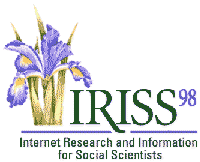Volume 12, Issue 2, 1998

Social Scientists give their angle on the Internet: IRISS ’98
A conference report from IRISS’98, (Internet Information and Research for Social Scientists), which was hosted by the Institute for Learning and Research Technology at the University of Bristol in March.
- Emma Worsfold
ILRT, Bristol
“Just when you plan to surf the Net in peace, along come the clipboards wanting to know why”
(Dan Jellinek writing about the IRISS 98 conference in The Guardian Online, Thursday March 26 1998)
In March 1998 social scientists (or clip-boards!) from around the World met up for the IRISS conference at the University of Bristol to discuss the impact that the Internet is having on their working lives. Over 200 delegates met to reflect on the practical and theoretical questions raised by the increasing role of networked information in the social sciences and in society. The conference aimed to address the following questions:
- how can social scientists make effective use of the Internet in their work?
- where and how are social scientists using the Internet to enhance their work and what effect is it having on traditional roles and working methods?
- what high quality information can the Internet supply to social scientists?
- how is the Internet impacting on individuals and society and what visions do we have for the future?
“Technology is applied social science” This was the slogan put forward by Professor Steven Woolgar who opened the conference with a keynote speech. He suggested that while the Internet can be a useful working tool for social scientists it should also be a focus for their research. The IRISS conference went on to include papers, workshops and presentations that reflected this dual approach.
The Internet as a tool for social scientists
An “Internet Gallery” enabled delegates to see some of the key Internet sites and services available for social scientists. Internet information providers demonstrated their sites in a networked computer suite - “exhibitors” included The Scout Report (from the USA), CASS Question Bank, CoMentor, CTI Centres, biz/ed, SOSIG, REGARD and Grapevine. Details of all the services exhibited can be found from the IRISS Web site.
The issue of Internet skills training was raised many times at the conference, indeed a number of hands-on workshops were held to enable delegates to learn new skills. Social scientists can benefit from using the many online databases available on the Internet such as: SOSIG, IBSS, MIDAS, EDINA, The Data Archive, Regard and BOPCAS. At the conference many of these networked services got together to arrange a joint training programme for UK users. This was the birth of the “Social Science Internet Roadshow” which now runs Internet training courses for social scientists in universities across the UK. Any economics departments interested in booking the Roadshow should visit the following URL for details:
http://www.ilrt.bris.ac.uk/training/socsci/
The Internet as a focus for social science research
Many of the papers described the work that psychologists, anthropologists, politicians and other social scientists are doing to study the impact of the Internet on individuals and on society. In a keynote speech Anne Campbell, MP for Cambridge, talked about the social impact of the information revolution, highlighting some of the ways that the Internet can be used to support local communities. Other papers covered topics such as the ethics of email, the presentation of self in WWW pages and the construction of cyber-communities. In the spirit of a conference about the Internet, all the papers can be found in on-line proceedings available from the IRISS Web site:
Pulling back the screens
IRISS ’98 was a great opportunity to meet the people behind the emails and the Web pages - and for people used to working in isolation behind their computer screens they were a very sociable bunch, eager to form new working relationships. At the conference dinner one group of delegates discovered that every person sitting around the table was from a different country. The “Table 15” group went on to set up a “virtual table” after the conference, using an email discussion list - and they still meet in cyberspace to discuss collaborative work and to chat. We hope that IRISS set a lot of people thinking and fuelled new ideas about the use of the Internet in the social sciences. With research into the social effects of the Internet at an early stage we look forward to hearing more about the social science angle on the Internet.

